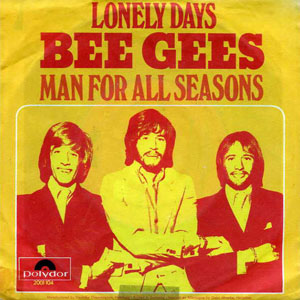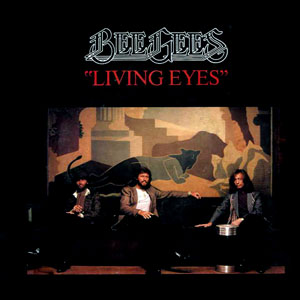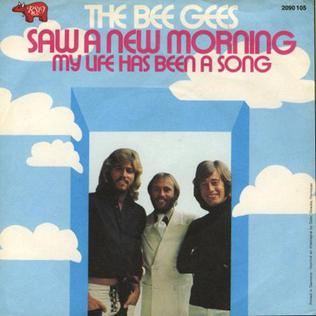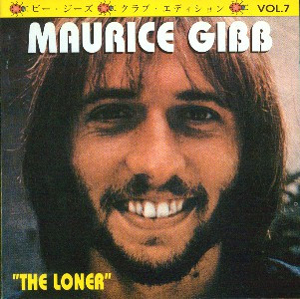
The Bee Gees were a musical group formed in 1958 by brothers Barry, Robin, and Maurice Gibb. The trio were especially successful in popular music in the late 1960s and early 1970s, and later as prominent performers in the disco music era in the mid-to-late 1970s. The group sang recognisable three-part tight harmonies: Robin's clear vibrato lead vocals were a hallmark of their earlier hits, while Barry's R&B falsetto became their signature sound during the mid-to-late 1970s and 1980s. The group wrote all their own original material, as well as writing and producing several major hits for other artists, and are regarded as one of the most important and influential acts in pop-music history. They have been referred to in the media as The Disco Kings, Britain's First Family of Harmony, and The Kings of Dance Music.

Maurice Ernest Gibb was a British musician and songwriter. He achieved worldwide fame as a member of the pop group Bee Gees. Although his elder brother Barry Gibb and twin brother Robin Gibb were the group's main lead singers, most of their albums included at least one or two songs featuring Maurice's lead vocals, including "Lay It on Me", "Country Woman" and "On Time". The Bee Gees are one of the most successful pop-rock groups of all time.

Sir Barry Alan Crompton Gibb is a British musician, singer, songwriter and record producer. Along with his younger twin brothers, Robin and Maurice, he rose to worldwide fame as a member of the Bee Gees, one of the most commercially successful groups in the history of popular music. Gibb is well known for his wide vocal range including a far-reaching high-pitched falsetto. Gibb's career has spanned over 60 years.

Trafalgar is a 1971 album by the Bee Gees. It was their ninth album, and was released in September 1971 in the US, and November 1971 in the UK. The album was a moderate hit in the United States, and peaked at No. 34. The lead single "How Can You Mend a Broken Heart?" was the first Bee Gees' No. 1 single in the United States but failed to chart in Britain as did the album. It is Geoff Bridgford's only full-length appearance on a Bee Gees album as an official member.

"Love You Inside Out" is a 1979 single by the Bee Gees from their album, Spirits Having Flown. It was their last chart-topping single on the Billboard Hot 100, interrupting Donna Summer's "Hot Stuff", becoming the third single from the album to do so. In the UK, the single peaked at No. 13 for two weeks. It was the ninth and final number-one hit for the Bee Gees in the US, and the twelfth and final number-one hit in Canada as well. The trio would not return to the top 10 for ten years, with the song, "One".

To Whom It May Concern is the tenth album by the Bee Gees. Released in October 1972, it is the follow-up to, and continues the melancholic and personal sound of its predecessor, Trafalgar. The album was recognised as "a farewell to the old Bee Gees" as the album marked the end of an era for the group in several ways: it was their last album to be recorded solely at IBC Studios, in London, their last with conductor and arranger Bill Shepherd, who had guided them since 1967, and their last under their first contract with Robert Stigwood. Some of the songs were old ones finished or rewritten for the occasion.

"How Can You Mend a Broken Heart" is a song released by the Bee Gees in 1971. It was written by Barry and Robin Gibb and was the first single on the group's 1971 album Trafalgar. It was their first US No. 1 single and also reached No. 1 in Cashbox magazine for two weeks.

"Lonely Days" is a ballad written and performed by the Bee Gees. It appeared on their album 2 Years On, and was released as a single, becoming their first Top Five hit in the US, peaking at number three in the Billboard Hot 100 and reaching number one in the Cashbox and Record World charts. Barry Gibb later re-recorded the song with country quartet Little Big Town for his 2021 album Greenfields.

"Don't Forget to Remember" also called "Don't Forget to Remember Me" is a country ballad recorded by the Bee Gees, from the album Cucumber Castle. The song was written by Barry and Maurice Gibb. It was produced by the band with Robert Stigwood.

"Living Eyes" is a power ballad recorded by the Bee Gees and was released in November 1981 as the second single and title track off the LP of the same name. It was written by Barry, Robin & Maurice Gibb. The sound of this single was closer musically to the rest of the album than its predecessor, "He's a Liar".

"I.O.I.O." is a song by the Bee Gees, released on the album Cucumber Castle. It was written by Barry and Maurice Gibb. The song was released as a single in March 1970, and was also one of the highlights of the album. The single was a relative success mainly on European charts. Its music video is taken from the film Cucumber Castle.

"Don't Wanna Live Inside Myself" is a ballad written and sung by Barry Gibb, and released on the Bee Gees' album Trafalgar in 1971, and the second single release taken from the album.

"My World" is a 1972 single released by the Bee Gees. It was originally released as a non-album single on 14 January 1972 worldwide. but was later included on the compilation Best of Bee Gees, Volume 2 in 1973. The flip side of the single was "On Time", a country rock number composed by Maurice Gibb. "My World" reached the Top 20 in both US and UK.

"Saw a New Morning" is the 1973 single released by the Bee Gees. It was also the group's first single released on Robert Stigwood's newly created records label RSO Records. The Bee Gees moved to Los Angeles in 1972 to record the album Life in a Tin Can which was a new direction for the group, who had been recording in England since 1967. The B-side, "My Life Has Been a Song" features lead vocal by Robin Gibb as well as Barry Gibb.
"The Only Love" is a song by the Bee Gees from their 1991 album High Civilization, released as the album's third single. The single's B-side was a previously unreleased live version of "You Win Again", recorded in Melbourne, Australia during their 1989's One for All World Tour. Although the song was released only in Europe as a single there, it did not chart in the UK, but it reached number 31 in Germany. The sleeve art for the single was a photo collage that included an image of Maurice’s daughter Samantha right in the center. A ballad, lead vocals are provided by Barry Gibb.
"On Time" is a song written by Maurice Gibb and recorded by the Bee Gees released on 14 January 1972 as the B-side of the single "My World".
"You Stepped into My Life" is a song released by the Bee Gees in September 1976 on the album Children of the World. It was also released as the B-side of "Love So Right". Written by Barry, Robin & Maurice Gibb.

The Loner is an album recorded in late 1969 by Maurice Gibb of the Bee Gees. An album master was compiled on 14 November 1970, but to date The Loner remains unreleased. Bootleg releases with the same title collect additional recordings unrelated to this album.

"Country Woman" is a song written and released by British rock band Bee Gees. It was written and performed solely by Maurice Gibb, and released as a B-side of "How Can You Mend a Broken Heart", which was the group's first US No. 1. The songs were released as a double A-side in Germany, France, Japan and Canada.
"Paradise" is a pop ballad recorded by the Bee Gees included on the 1981 album Living Eyes. It was later released as a single in Netherlands and Japan with "Nothing Could Be Good" as the B-side. It was included on the 1983 greatest hits album Gold & Diamonds.
















